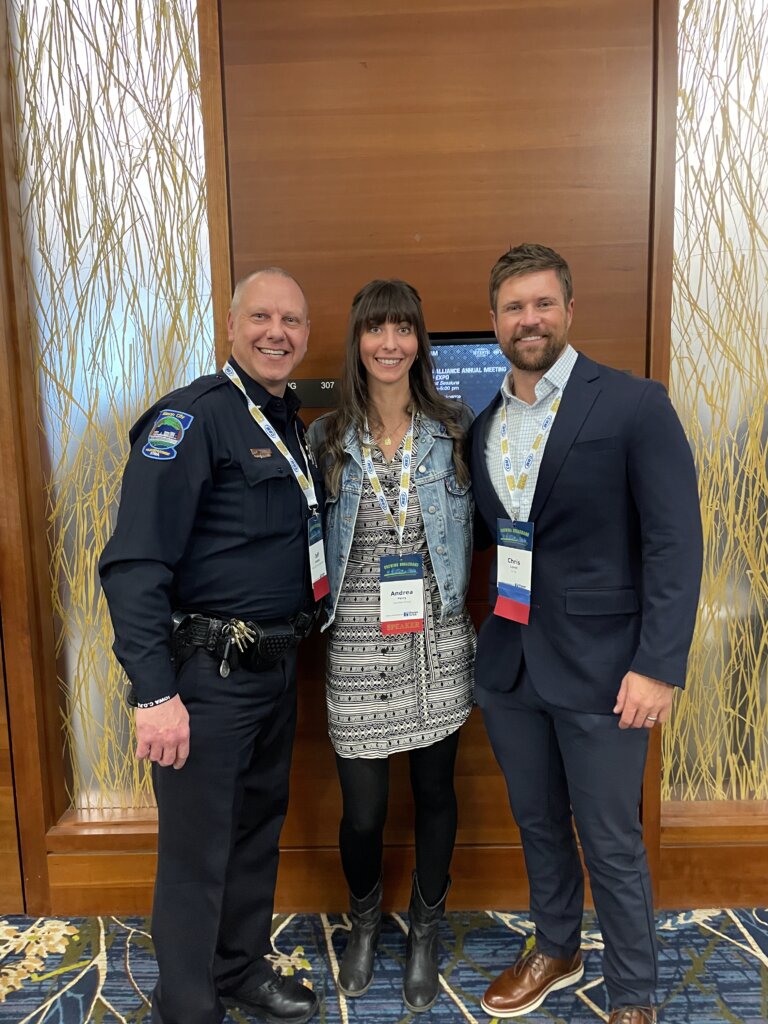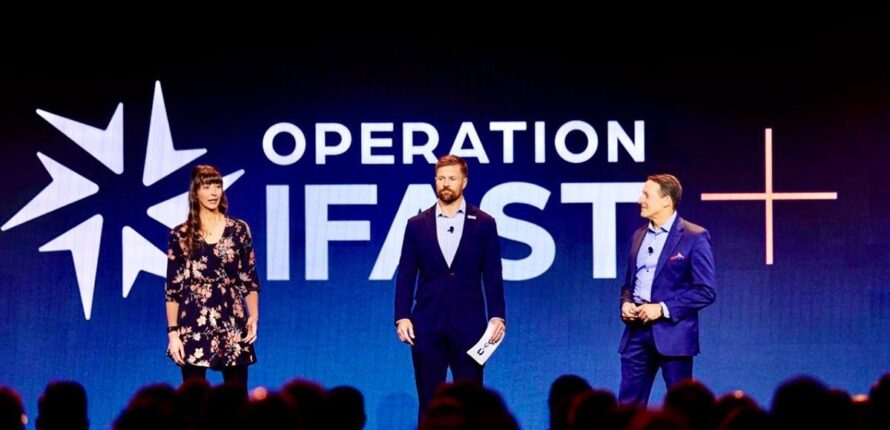The Room Where Everything Changed
It started in a pediatric oncology room in 2022. The kind that hums with fluorescent lights, machines, and unspoken prayers.
Chris Lovell’s daughter had just been diagnosed with leukemia. In that quiet blur of fear and hope, time folds in strange ways. Days and nights were separated only by the sound of another IV pump starting its rhythm.
He couldn’t trade places. Couldn’t fix the charts. Couldn’t cure what was happening.
So he did what most of us do when we feel powerless. He reached for connection. Scrolling. Searching. Trying to find anything that made sense of a senseless moment.
But instead of comfort, he stumbled onto a truth he couldn’t unsee. The same Internet that connected families and communities was also being used to sell children.
75% of underage trafficking victims in the U.S. report being sold online. Not in alleys. Not in movie-script kidnappings. Online and in the open, through ads and apps that look disturbingly normal.
For someone whose life revolved around building better Internet, this was a devastating revelation.
The tool he believed in was also the weapon being used to harm. And in that contradiction, something broke and something new began.
The Moment of Refusal
When you can’t fix your child’s illness, you find something you can fix.
So from that hospital room, Chris opened his laptop and typed a single, trembling message to a nonprofit he’d discovered online:
“I’m Chris. How can ISPs help?”
It wasn’t polished. It wasn’t strategic. But sometimes the world doesn’t need strategy. It needs nerve.
That message would ignite a movement now known as Operation IFAST:
Internet Service Providers Fight Against Sex Trafficking. A partnership born not from corporate mandate but from moral urgency.
The Collision Point
To understand why IFAST matters, you have to sit in the discomfort of its paradox.
The Internet is our society’s nervous system, powering connection, commerce, education, and joy.
But it’s also the fastest-growing marketplace for exploitation. The United Nations calls human trafficking the fastest-growing criminal industry on Earth. Analysts estimate that ads for sexual services — many of them involving victims — appear 300,000 times per day across U.S. websites. These aren’t hidden corners of the dark web. They’re embedded in the same algorithms that recommend your weekend getaway or your next streaming series.
It’s a system problem, coded in convenience.
The Birth of a Movement

Chris reached out to Guardian Group, a nonprofit run by veterans and intelligence specialists who help law enforcement identify victims online. They were skeptical.
They’d seen dozens of outreach attempts from people who said, “We want to help,” only to vanish when things got complicated. But this was different.
Together, with the help of Guardian Group Marketing Director Andrea Lowe, they began to build something no one had done before. A framework that invited ISPs — the companies that run the Internet — to become part of the solution.
They called it the IFAST Model. The three pillars are train, connect, and raise.
Train: Equip ISP employees to spot signs of sex trafficking while physically in the field/community.
Connect: Connect local law enforcement with Guardian Group so they can receive the victim identification and free analytical support that Guardian Group provides.
Raise: Provide sustainable funding ($1,591.00 per year per company) to expand Guardian Group’s analyst network so more victims can be found and freed by law enforcement.
What began as one company’s idea is now an industry movement.
Proof That It Works
Today, 74 companies have joined IFAST. More than 1,200 employees have completed training. And one story among many proved that the model saves lives.
A small-town ISP had introduced its local police department to Guardian Group. Weeks later, an officer received a trafficking lead from outside his jurisdiction. He passed it to the correct department. Within 48 hours, the victim was located, rescued, and placed in aftercare. The trafficker was arrested and charged federally.
That single connection closed a loop that changed a life. One ISP. One conversation. One referral.
The Industry That Looked in the Mirror
Not everyone was comfortable at first, Chris recalls. “Should an Internet company really be getting involved in this?”
“It’s too dark, too messy, too hard.”
But the truth is, discomfort is the signal that you’re looking at something important.
“Community-based broadband providers are wired for responsibility,” said Chris. “Especially in rural America. We don’t just connect homes. We protect them.”
The truth started close to home. Chris didn’t begin this movement alone or on a national stage. He began it in North Iowa, asking Mason City Police Chief Jeff Brinkley how an ISP could play a role in protecting local kids. Brinkley listened, asked hard questions, and helped lend credibility to a cause that most had never imagined intersecting with telecom, sharing the stage with Chris and co-founder Andrea Lowe.
From there, Clear Lake’s police department, first under Chief Roth and later with Chief Colby, joined the effort, speaking publicly about why this partnership mattered. The Cerro Gordo County Sheriff’s Office, under Sheriff Pals, also lent early support. Each step added a new thread of legitimacy, creating a local network of trust that others could model.
These weren’t performative partnerships. They were working on collaborations, sharing training sessions, joint awareness events, and coordinating communication with Guardian Group. It’s the kind of cross-sector action that rural communities do best. Small circles of people deciding that someone should do something and realizing they’re the someone.
The Moral Upgrade
What IFAST represents isn’t just corporate social responsibility. It’s a moral upgrade to the Internet itself.
For decades, broadband providers have measured success in megabits and uptime. Now they’re measuring something more challenging to quantify — impact.
And it’s spreading.
Chris said IFAST is expanding into the electric utility space through partnerships with electric cooperatives, organizations that represent providers covering over 55% of the U.S. landmass.
The goal is to replicate the IFAST framework across multiple service industries. Because when entire sectors align around the simple question “How can we help,” the Internet stops being neutral.
It becomes human again.
The Power of 5,000
Guardian Group’s data scientists have run the numbers. If just 5,000 people commit to donating $15.91 per month through the companion effort known as Project 1591, it would fund enough analysts to monitor every U.S. city where trafficking ads are posted.
That’s 5,000 people turning empathy into infrastructure. 5,000 ordinary citizens giving the Internet its conscience back.
Once You See It, You Can’t Unsee It
Chris often quotes JFK when speaking about IFAST… “The only thing necessary for the triumph of evil is for good people to do nothing.”
Because he knows some people will nod and then move on. But those who don’t? They become part of something larger. He also leans into another quote… “There are risks and costs to action, but they are far less than the long-range risks of comfortable inaction.”
That’s the tension at the heart of IFAST. The courage to trade comfort for conscience.
The Internet as It Was Meant to Be
From that hospital room to national stages, the journey has been improbable. But the through line is simple. Connection should never come at the cost of innocence.
Those early partnerships in Clear Lake and Mason City gave IFAST its first real foundation. A working model that small towns could lead a national shift. What began as one company and three local departments has become a framework reaching across 74 companies, 1200+ trained employees, and a growing network of officers nationwide.
“The Internet was built to bring us closer,” Chris said. IFAST is making sure it doesn’t tear us apart.
“So whether you’re a broadband provider, a city official, or a parent, you have a role,” he added. “You can train. You can connect. You can give.”
Because the same network that carries our lives can also deliver the leads that save them.
How You Can Help
If you work at a broadband company, enroll in Operation IFAST and schedule your team’s training.
If you’re in law enforcement, sign up to receive Guardian Group’s real-time trafficking leads. Free of charge.
If you’re a citizen, become a $15.91/month donor through Guardian Group’s Project 1591.
Once you know, you can’t unknow. But once you act, others will too.



